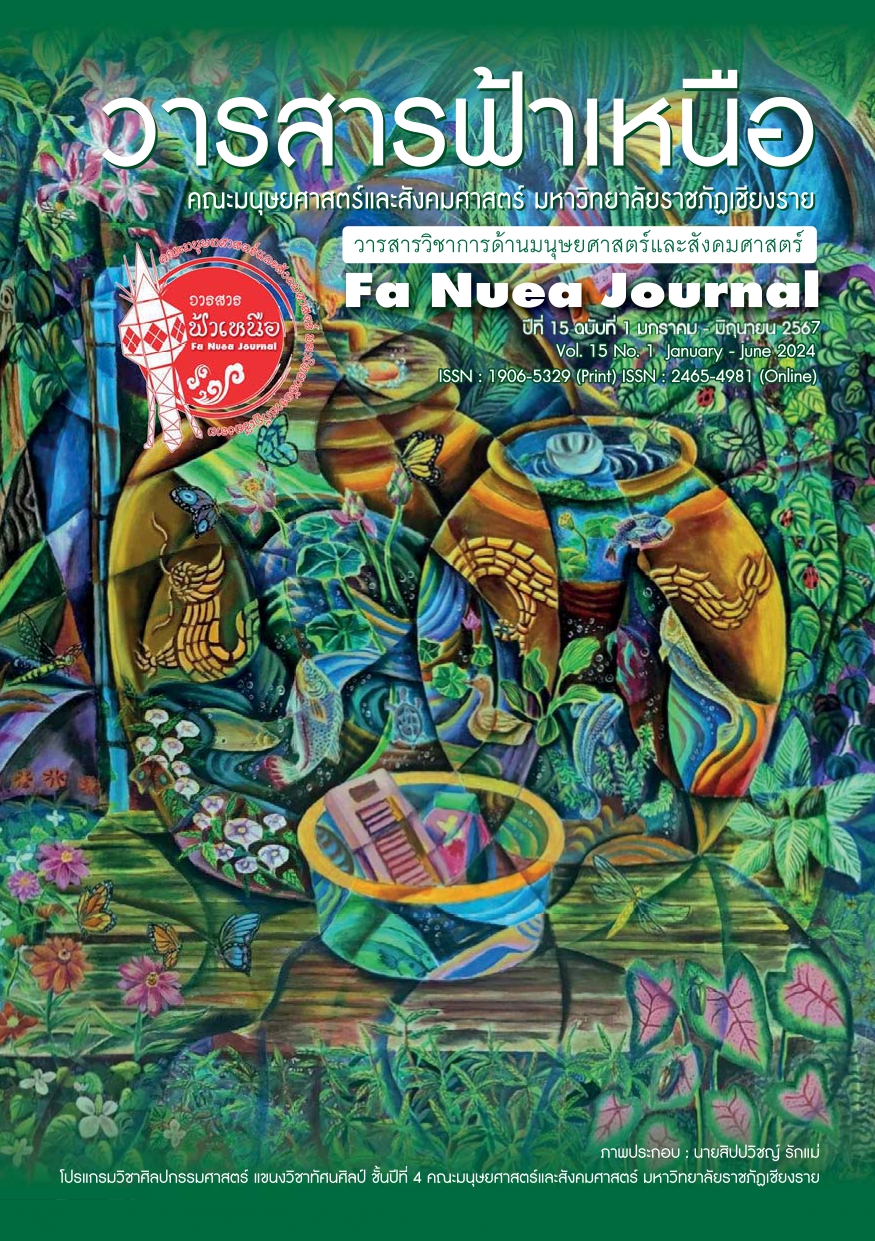Expectations of Learning English for the 1st Year English Major Students, Faculty of Humanities and Social Sciences, Chiang Rai Rajabhat University
Main Article Content
Abstract
This research aimed to investigate the English learning expectations of the 1st year students majoring in English, Faculty of Humanities and Social Sciences, Chiang Rai Rajabhat University. The sample group consisted of 103 first-year English majors, selected using a purposive sampling method. The research tool was a questionnaire on expectations for learning English, consisting of 6 aspects: 1) self-assessed English language skills, 2) course content, 3) teaching style, 4) teaching process, 5) classroom teaching materials, and 6) assessment methods. The results of the research found that the overall average expectation for English learning in all 6 aspects was at a high level with an average agreement level at 3.89. When considering each aspect, it was found that students had the highest expectations for teaching style with an average agreement level at 4.24, followed by expectations for self-assessed English language skills at a high level with an average agreement level at 4.08, and the lowest expectations for assessment methods with an average agreement level at 3.47. Therefore, instructors should prioritize fun and interesting teaching strategies, along with the direct and clear development of students' English language skills, to align with students' expectations.
Article Details

This work is licensed under a Creative Commons Attribution-NonCommercial-NoDerivatives 4.0 International License.
Articles, information, content, pictures, etc. which have been published in Fa Nuea Journal, are copyright of Fa Nuea Journal. If any person or party wishes to disseminate all or part of it or take any action must be referenced. Do not use for commercial purposes and do not modify (CC-BY-NC-ND). For further details, please access at Attribution-NonCommercial-NoDerivatives 4.0 International (CC BY-NC-ND 4.0)
References
กัญญารัตน์ เอี่ยมวันทอง. (2565). การพัฒนาการจัดการเรียนการสอนภาษาอังกฤษ สำหรับนักศึกษาในศตวรรษที่ 21 กรณีศึกษานักศึกษาชั้นปีที่ 1 สาขาวิชา ภาษาอังกฤษเพื่อการสื่อสารสากล คณะศิลปศาสตร์. วารสารรัฐประศาสนศาสตร์มหาวิทยาลัยราชภัฏสวนสุนันทา, 6(1), 214-225.
จิรารัตน์ ประยูรวงษ์. (2562). Digital Learning การเรียนรู้ภาษาอังกฤษบนโลกดิจิทัลในศตวรรษที่ 21. วารสารบัณฑิตศึกษามหาวิทยาลัยราชภัฏวไลยอลงกรณ์ในพระบรมราชูปถัมภ์, 13(1), 210-223.
ชัยวัฒน์ แก้วพันงาม. (2559). เทคโนโลยีเพื่อการประเมินการเรียนรู้ภาษาสำหรับผู้เรียนในศตวรรษที่ 21. Veridian E-Journal, Silpakorn University (Humanities, Social Sciences and arts), 9(3), 436-452.
ญาณิศา สู่ทรงดี, วิโรจน์ ทองปลิว, จงกิจ วงษ์พินิจ, ทองพูล ขุมคำ, และศิรประภา รัตนรวมการ. (2566). การจัดการเรียนรู้ภาษาอังกฤษแห่งศตวรรษที่ 21. วารสารมนุษยศาสตร์และสังคมศาสตร์ มหาวิทยาลัยราชภัฏสุรินทร์, 25(1), 273-292.
ปัณฑ์นพ ผจญทรพรรค, ณัฐวุฒิ โพธิ์ทักษิณ, และ นรินทร์ มุกมณี. (2564). ปัญหาการเรียนภาษาอังกฤษของคนไทย. วารสาร มจร อุบลปริทรรศน์, 6(3), 911-920.
วิชัย พัวรุ่งโรจน์, ภัทร์พงศ์ พงศ์ภัทรกานต์, และ สุชาดา พรหมโคตร. (2560). แนวโน้มวิธีการเรียนการสอนยุคใหม่ด้วย เครื่องมือประเมินผลระหว่างเรียนออนไลน์. Walailak Journal of Learning Innovations. 3(2), 45-68.
สมบัติ ท้ายเรือคำ. (2557). การวิจัยและพัฒนา: วิธีการวิจัยเพื่อพัฒนางานวิจัย. Journal of Research and Development Institute Rajabhat Maha Sarakham University, 1(1), 2-11.
Boster, F. J., & Johnson, K. M. (2019). Expectancy violation theory. In Encyclopedia of communication theory (Second Edition), 399-405.
Hancock, J. T., McDaniel, B. T., & Thomas, R. L. (2019). Social perception of artificial intelligence technologies: A critical review. Human-Computer Interaction, 34(4), 336-372.
Krejcie, R. V., & Morgan, D. W. (1970). Determining sample size for research activities. Educational and psychological measurement, 30(3), 607-610.
Oeamoum, N., & Sriwichai, C. (2020). Problems and Needs in English Language Teaching from the Viewpoints of Preservice English Teachers in Thailand.Asian Journal of Education and Training, 6(4), 592-601.
Osgood, C. E., & McGuire, W. J. (1981). The communication-persuasion model. In M. E. Roloff & G. R. Miller (Eds.), Interpersonal processes: Interpersonal communication (pp. 40-77). Sage Publications.
Phỉ, T. T., Thơ, V. Đ., Thành, N. L. H., Khanh, H. Đ. P., & Khanh, P. T. (2016). Application of Quizlet. Com to teaching and learning business English vocabulary at the University of Economics ho chi Minh City. In Proceedings of the First International Conference on Language Development (pp. 230-238).


